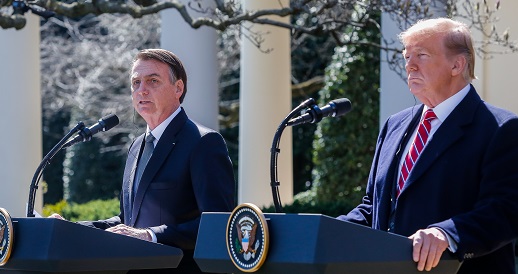Trump and Bolsonaro’s North-South ‘Axis’
March 21, 2019 | Expert Insights

Bolsonaro and Trump’s comradery boosts the Brazil-US relationship, although a NATO membership is unlikely.
Background
Brazil is the world's fifth-largest country in the world and the sixth most populous. Its capital is Brasília, and the most populated city is São Paulo. Brazil’s armed forces are the third largest in the Americas and the largest in Latin America in terms of military equipment. The lack of serious internal and external threats allows Brazils armed forces to search for a new role. This has allowed the military to be involved in civic-action programs throughout the nation. The President exercises executive authority over the armed forces.
Jair Bolsonaro is a retired military officer who began his term as Brazil’s 38thPresident on January 1, 2019. A member of the Social Liberal Party, Mr. Bolsonaro rode a wave of voter dissatisfaction to office assisted a social-media campaign similar to President Trump’s. He has promised to fight the corruption of Brazil’s political elites and has spoken in favour of extrajudicial killings. Seeking considerable changes to Brazil’s foreign policy and has sought closer ties with the United States, Israel, Japan, South Korea and Taiwan, while voicing distrust towards China.Mr. Bolsonaro has consistently praised President Trump and his foreign policy and has said that he will upgrade Brazil’s relationship with the US, garnering US National Security Advisor John Bolton’s praise as a “like-minded” ally. Bolsonaro has even floated the possibility of a US military base in Brazil to help counter Russian influence in the region.
Analysis
Mr. Bolsonaro visited the White House on March 19, 2019, during his first foreign trip after assuming office, saying to Mr. Trump, “I’ve always admired the USA and this sense of admiration has only increased since you took office.” Mr. Trump in return stated, “We have many views that are similar. Both parties voice significant approval of the other in a departure from Brazil’s previously testy relationship with the US, a result of Brazil’s long string of leftist governments.The similarities between the two ranges from climate change skepticism to ideological disapproval of socialists and communists, providing the basis for mutually beneficially cooperation.
Significantly, the news conference on March 19 spent significant time discussing efforts to deal with the ongoing Venezuelan crisis. Brazil shares a long border with Venezuela and is positioned in an ideal location to strategically engage the troubled state. Mr. Bolsonaro, as an ex-military man who has expressed admiration for Brazil’s former anti-communist military dictatorship, provides the Trump administration with a willing partner against socialist Venezuela. This position by Mr. Bolsonaro affords Brazil long-sought concessions from the US. President Trump told reporters, “I… intend to designate Brazil as a major non-NATO ally or even possibly, if you start thinking about it, maybe a NATO ally.” As a major non-NATO ally, Brazil’s path to US weaponry and other military ties is made legally simpler.
Mr. Trump’s suggestion that Brazil joins the North Atlantic Treaty Organization (NATO) is unprecedented. NATO’s 29 country grouping is typically centred around North America and Europe. Brazil’s inclusion would be an anomaly given that no country in NATO is from the South Atlantic or Latin America.It is unlikely that NATO’s members would be amenable to such an end, reflected by Mr. Trump’s quip that he would have to “talk to a lot of people.” It is likely that NATO engages with Brazil through the Partnership for Peace (PfP) program that affords partner countries the entire range of NATO’s cooperative activity. Brazil’s regional neighbour, Columbia is already part of the PfP program, thereby easing Brazil’s ascendancy into the program.
Counterpoint
Despite the convivial nature of Mr. Bolsonaro’s visit to America, there remains a major sticking point; protectionist trade policies. Mr. Trump will continue to apply his world-wide drive to open up to more US products in Brazil.
Assessment
Our assessment is that the warming of the Brazil-US relationship is largely dependent on the personal relationship between its leaders. We believe that so long as Mr. Trump and Mr. Bolsonaro rule their respective countries, they are likely to develop closer ties with one another. The first litmus test in this relationship will be Brazil-American cooperation in Venezuela. We believe Brazil is more likely to join NATO’s PfP program than becoming a full-fledged NATO member.
Image Courtesy: https://upload.wikimedia.org/wikipedia/commons/2/26/Bolsonaro_with_US_President_Donald_Trump_in_White_House%2C_Washington%2C_19_March_2019.jpg,Isac Nóbrega/PR [CC BY 2.0 (https://creativecommons.org/licenses/by/2.0)]








Comments